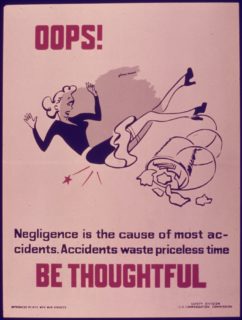Protect Your Cannabis Business from the Bad Acts of Your Employees: Part 2
Protect Your Cannabis Business from the Bad Acts of Your Employees: Part 2

Be thoughtful, and beware!Sometimes, our clients are surprised to learn that a cannabis business can be held liable for the bad acts of its employees. This includes: 1) liability to the general public, and 2) state administrative sanctions, including license forfeiture. We previously discussed the importance of having a strong sexual harassment policy and action plan to avoid liability for harassment suits. But what about other bad acts committed by employees? Employers can be found liable under a few different tort theories. Today’s post will discuss the tort of negligent hiring and retention.
Negligent hiring or retention arises when an employee commits a bad act against another employee or a third party. The injured party, usually in addition to bringing suit against the bad actor, will bring a negligent hiring or retention claim against you, the employer. These claims are not always persuasive or even justified, but they can be stressful and expensive, so it is important to take precautions where possible.
To prevail on a negligent hiring or retention claim, the injured party must prove that the employer “knew or reasonably should have known” about the employee’s dangerous or untrustworthy character. For example, let’s say you are hiring a budtender who will have access to customer’s credit cards and will handle money. You find out that the applicant has a previous history of credit card fraud. If you hire that applicant and he or she later fraudulently uses a customer’s credit card, you could be held liable for the bad act of that employee. Even if you hired the employee without knowledge of the bad acts, but you easily could have found out about the bad acts, you could be held liable.
Using the same example, if you know the applicant has a history of credit card fraud, it does not mean you cannot hire the applicant. It just means that the applicant should not be placed in a position where they have access to money or credit cards. That may sound like common sense, but business owners often make these types of mistakes.
There are several easy measures you can take to ensure that you are aware of an applicant’s history and character. Pre-employment background checks can reveal past felony or conviction histories that will allow you to make informed hiring decisions. Pre-employment physicals can also be a good idea. If you are hiring for a position that required frequent lifting of heavy items, you want to ensure that the person can actually perform the heavy work. If they can’t, and they injure someone else because of it, your cannabis business could be liable.
If a pre-employment background check seems like too much, there are other less invasive ways to vet your applicants. Request references and follow up on past employment. This is an easy and efficient way to determine someone’s character and fitness for the position. Simply ask past employer’s if they would re-hire the person and if not, why not. This is not only a good idea to protect yourself from negligent hiring claims but also to ensure you are obtaining the best employees for your business. You can also validate academic credentials and places of employment to get a sense of truthfulness about your applicant.
Pre-employment background checks and thorough vetting are especially important for certain positions. Some states allow marijuana deliveries. A delivery driver is trusted with a lot: the safety of others on the road, the safety of the delivery purchaser, with product, and with money transactions. Ensuring a clean driving record could save you significant liability in the future.
Pre-employment background checks and general vetting can be done, as long as they adhere to “ban the box” requirements. Many states, including Oregon and California, are passing laws that prohibit employers from requesting information about past convictions prior to interviews or conditional job offers. If you are unsure about what questions you can ask, it’s better to reach out to someone knowledgable than to make a crucial error.
Finally, if you discover an existing employee has a history of endangering people in some way, consider whether it’s appropriate to move the employee’s position or to terminate the employment. Thorough investigation of applicants can not only protect you from negligent hiring claims, but also will result in selecting the highly qualified employees that fit your business model. After all, the last thing you want to worry about is risking it all due to someone else’s error.
Go to Source
Powered by WPeMatico
